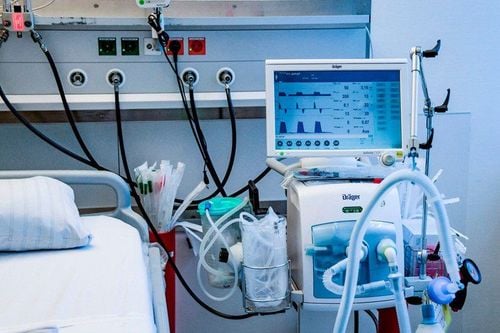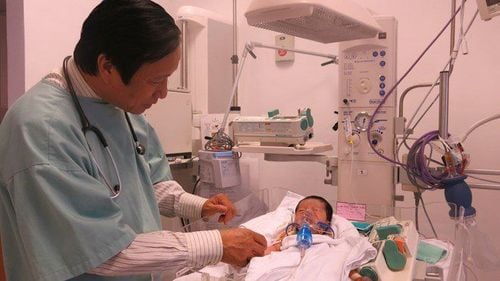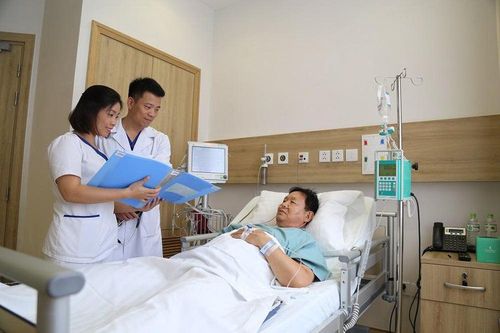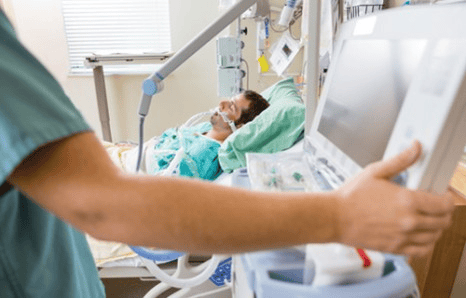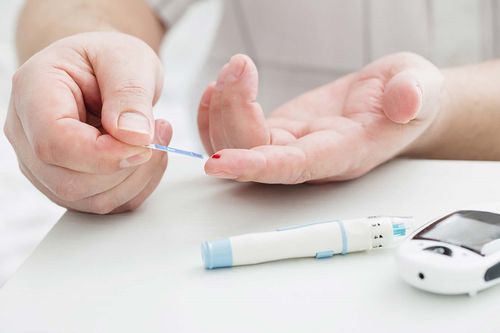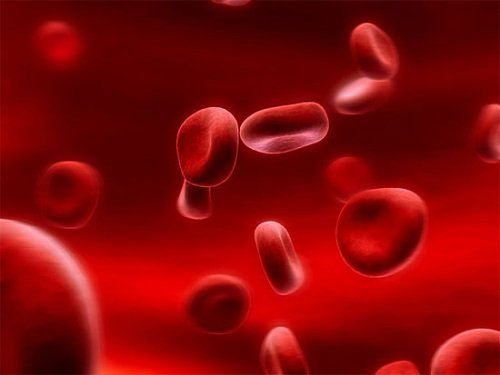This is an automatically translated article.
The article is professionally consulted by Master, Doctor Phan Ngoc Toan - Emergency Medicine Doctor - Emergency Department - Vinmec Danang International Hospital.The nutritional needs of ICU patients are complex. These patients may need to have their protein and electrolyte composition adjusted. Nutritional issues for mechanically ventilated patients lying in intensive care for a long time are particularly important affecting the patient's ability to recover.
1. Determining the time to nurture
The majority of patients are fed within 24 hours of admission.
Provide nutrition for mechanically ventilated patients, critically ill patients: Immediately after hemodynamic stabilization (24 – 48 hours).
No nutritional intervention in severe shock (persistent lactic acidosis, intestinal ischemia, intestinal obstruction or gastrointestinal bleeding)
Postoperatively:
In general, it is not necessary to discontinue enteral nutrition after surgery . Encourage early enteral nutrition within 24 hours of surgery.
2. Determine nutritional needs of the patient
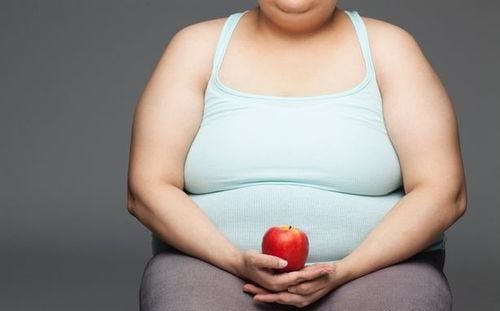
For patients with severe malnutrition, it is necessary to provide about: 35-40 kcal/kg/day.
For normal, mildly malnourished patients, it is necessary to provide about: 25-30 kcal/kg/day.
For overweight and obese patients, it is necessary to provide about: < 25 kcal/kg/day.
Amount of protein needed to ensure nutrition for ICU patients (g/kg/day):
1.2 - 1.5 (mild/moderate increase in metabolism) 1.5 - 2.0 (increase in metabolism) Severe) Amount of lipids needed to ensure nutrition for ICU patients (g/kg/day):
For normal patients 0.8 - 1.0 For patients on mechanical ventilation 1.0 -1 ,3 Amount of Glucid needed to ensure nutrition for ICU patients (g/kg/day): 3 – 5

In case of severe malnutrition or when the patient is hungry for > 7 days, start feeding again with 10kcal/kg/day (Note Na, K, Mg, P; give Vit. B1 TTM and monitor glucose blood). Increase gradually by 5kcal/kg over the following days if well tolerated. Nutritional requirements for patients in resuscitation:
24 - 48 hours after admission to ICU: 20kcal/kg/day After 48 hours of ICU admission: 25-30kcal/kg/day
3. Determine the way to nourish
Provide nutrition to ICU patients through oral feeding:
Apply a normal diet Monitor the patient's ability to eat within the first 3 days of hospital stay. If < 50% of energy and protein needs; Supplement nutrition drink (nutrition milk according to pathology). Enteral nutrition (EN): Monitor the patient's ability to eat during the first 3 days of hospital stay. Patients with only <60% of energy and protein requirements for 3 consecutive days, should consider supplementing with intravenous nutrition; Prioritize nutritional supplements via the gastrointestinal tract.
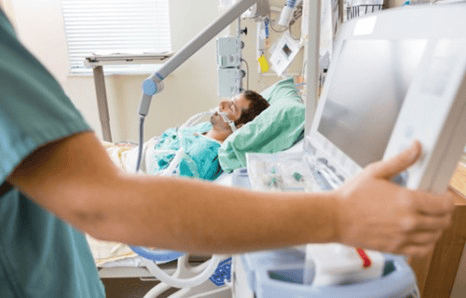
How to determine Nutrition for patients on mechanical ventilation through the veins as follows:
Step 1: Energy from diet or milk (1ml = amount of Kcal) as tolerated by the patient
Step 2: Calories for nutrition Intravenous nutrition (If available)
Intravenous protein = Total protein requirement – Protein from patient's diet/drink/day Calories for intravenous infusion = Total caloric requirement – calories from gastrointestinal tract (EN) . Step 3: Choose a peripheral or central venous line.
Peripheral intravenous infusion (< 850mmosm/L) Central intravenous infusion (> 850 mmosm/L) Whole parenteral nutrition:
Intravenous fat emulsions should be used (unless contraindicated. ) Administer 3 or more substances at the same time, infusion over 20-24 hours 3:1 or all-in-one bag. Complications should be prevented when initiating resuscitation by assessing the nutritional status of the resuscitated patient. :
Poor diet lasting > 7 days Weight loss ≥ 10% of body weight/6 months SGA – C (or marasmus or Kwashiokor malnutrition) Patients with prolonged anorexia (may be due to dieting, alcoholism, anorexia nervosa, mouth ulcers...)
4. Prevention of complications
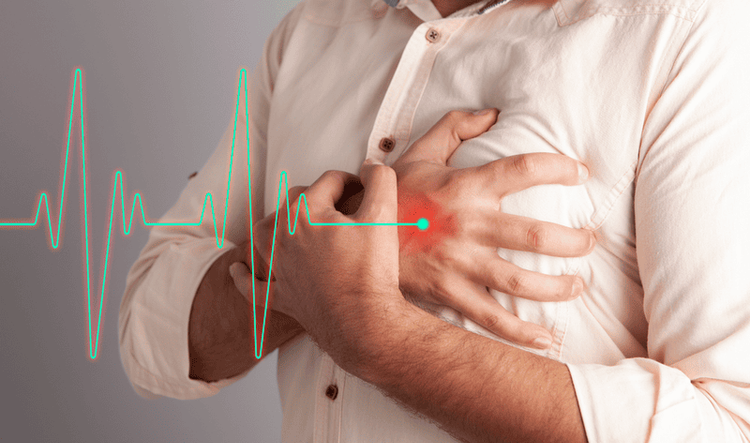
Nutrition for ICU patients need to prevent complications, in which refeeding syndrome can be caused by:
Nutrition through a feeding tube right in the first 1-3 days of overfeeding, fast Nutrition Fast intravenous nutrition infusion Symptoms of the syndrome:
Hyperglycemia Severe electrolyte disturbances (sodium, kalium, magnesium, phosphate) Acute heart failure, cardiac arrhythmia Acute pulmonary edema Prevention of feeding syndrome Refeeding syndrome:
Days 1-3: 10 - 15kcal/kg/day, fluid balance, Na, potassium, Mg, P, IV infusion. B1 IV 200mg Feed through feeding tube / slow intravenous nutrition The following days increase every 5kcal/kg/day
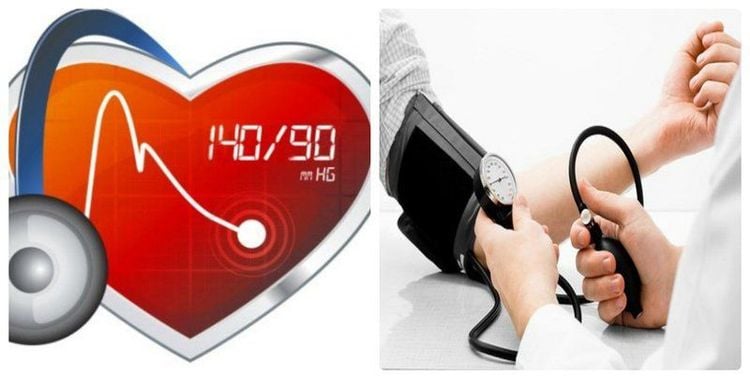
Nutrition for ICU patients in the prevention of refeeding syndrome:
At the beginning of feeding: little and gradually increasing
- Day 1: 15 kcal/kg/day
- Day 2: 20 kcal/kg/day
- Day 3: 25 kcal/kg/day
- Day 4: 30 kcal/kg/day
- Feeding through the tube:
- Day 1: 100 ml * 4 servings/day (20 drops/minute)
- Day 2: 150 ml * 4 servings/day
- Day 3: 200 ml * 4-5 servings/day
- Day 4: 250ml - 300 ml * 4-5 servings/day
- Slow intravenous infusion as recommended Recommendations
In addition, nutrition for ICU patients may also experience some other complications such as:
Due to underfeeding or excess: Lack of nutrition causes malnutrition. Excess causes increased blood sugar, urea, blood osmotic pressure, triglycerides... respiratory burden. Related to the tube: Misplaced: bronchi, lungs. Esophageal ulcer, aspiration. Intravenous nutrition: Bleeding, phlebitis. Catheter sepsis. Assessing the nutritional status of convalescent patients is especially important, so that the most reasonable nutrition for ICU patients is given to help patients quickly recover after a long time of treatment. resuscitation or mechanical ventilation.
Caring for ventilator patients is very important and directly affects the patient's health and recovery. Therefore, patients need to be cared for by a team of qualified, qualified, and professional doctors, nurses, and nurses.
Vinmec International General Hospital is a medical facility with highly qualified and professional human resources from famous domestic and international medical universities. The most modern and advanced equipment system in Vietnam. Here, patients are cared for wholeheartedly, thoughtfully, with quick recovery time.
Please dial HOTLINE for more information or register for an appointment HERE. Download MyVinmec app to make appointments faster and to manage your bookings easily.





